Emacs has an ancient (predating hypertext), simple, powerful documentation program called Info. It’s very difficult to find info about it online (try searching for “Info”), so here’s my beginner’s guide.
Info is an output format for the Texinfo typesetting syntax. Texinfo is used for writing documentation that can be output in multiple print and digital formats and is the official documentation format of the GNU project. Info files are strongly associated with Emacs – Emacs is the primary reader for Info files, but there is also a standalone reader. Manuals are organized into a tree of nodes, with a variety of ways to navigate between those nodes.
Info files can technically be written by hand, but it is much more common for them to be compiled from Texinfo. Many Linux/Unix distros come bundled with the TeX toolchain necessary to compile Texinfo, but Windows does not. The TeX/LaTex/Texinfo on Windows post is coming in the near future. For now, stick to precompiled .info files or go dive into TeX yourself.
Emacs ships with several Info manuals – they’re in the emacs/info folder. You can also create your own Info directory, add new manuals to the directory, and create your own manuals. This guide will walk you through the steps needed to get Emacs to find your info directory, add manuals in your directory to the main directory list, and use Info from within Emacs.
[NOTE: This guide assumes you’re following the directory conventions I laid out in my previous post Installing CLISP, Emacs, and SLIME on Windows XP. It also gives you the baseline level of familiarity with Emacs to follow along here.]






